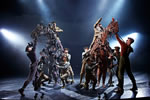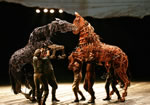Make the most of it... stay overnight
www.booking.comSave up to 40% off UK hotel rooms. The perfect weekend getaway.

www.booking.comSave up to 40% off UK hotel rooms. The perfect weekend getaway.

redletterdays.comIrresistable gifts, including short breaks, thrills, attractions, adventure and gifts.

my.britevents.com/adsThis ad costs just £0.001 per page. Can you afford NOT to buy this advert?
Feature article by BritEvents.
0 Comments
Previous: Matthew Bourne's The Nutcracker
As Stephen Spielberg's eagerly anticipated film War Horse hits the screens in January, BritEvents' Lucy Middleton reviews the original, ever popular West End show that inspired it, interviewing seasoned puppeteer, Emily Cooper, to discuss the show's success.


By Lucy Middleton
BritEvents Contributor
Playing to sold-out audiences and consistently receiving great critical acclaim, War Horse tells the compelling story of a farm boy's compassion for his horse. Raised from a foal, Joey is cruelly sold to the infantry by the boy's father. Too young to enlist in the army, heartbroken 16-year-old Albert Narracott is determined against all odds to bring home his beloved Joey.
The New London Theatre's stage features a rotating disc and paints an austere, gloomy setting. The horse puppets are such large main characters that the rotating disc was a stroke of genius, adding depth and movement in a limited space where the horses could really stretch their legs. The background is mostly black with a break suggesting a torn sketchbook page. From his first vision of Joey galloping across the fields of Devon, to the horrors of the battlefields in France, Captain Nicholls who takes Joey to war as his steed sketches the world around him. The 'torn page' in the background is essentially the visual prompt for numerous scenes, often showing the date along with a sketch to inform the audience of time-lapses and locations.

Though the basic plot of the story is somewhat simple, the production is magical thanks to the full cast of engaging characters. For me, the key element that makes or breaks a work is character development; not enough and an audience's attention wavers, they are unable to empathise, while too much can cause information overload, overcooking them. War Horse's main characters are genuine, often humorous and incredibly likeable.
A poignant feature in the play is a shared humanity. As Joey is captured by the Germans and put to work, he's shown unexpected kindness by Friedrich Muller, who misses his family and wonders why he's there, just like the English soldiers. The show has a mostly neutral stance, echoing the horses' presence who are unable to take sides.
Approximately 10 million people died during World War I along with untold millions of brave horses and, while Armistice Day annually pays tribute to the memories of soldiers, this play commemorates their trusty steeds who also lost their lives.

On his way to war Joey meets military horse, Topthorn, who remains throughout the story as his close ally . Despite horrendous experiences incomprehensible to Joey, he still has the capacity for forgiveness and obedience, which in turn makes the horse's role in battle sadder. The audience is heartbroken as they follow Joey on his journey, fearing for his safety.
There are three parts to the magnificent horse puppets; two puppeteers in the front and back of the body known as the 'heart' and 'hind', and a third works the neck of the horse, controlling its facial expressions, ears and neck movement. The trio of puppeteers work in unison to physically manipulate these life-sized horses with such skill and accuracy that it causes great emotional investment in the horses, who take on a life of their own. Equally worth mentioning is an audience favourite, the farmyard goose who offers welcome comic relief.
The play takes its inspiration from the Michael Morpurgo book of the same name and though it was written for children, I would suggest that the theatre production is unsuitable for a young audience. There are loud noises in the war scenes that could frighten children, while the emotionally turbulent storyline may cause distress. I would recommend the play is better suited to audiences over the age of 12.
 Emily Cooper, puppeteer with the War Horse production
Emily Cooper, puppeteer with the War Horse productionWar Horse's international success is undoubtedly due to its imagination and ability to move the audience's emotions to empathise with puppets. War Horse has transformed the perceptions of the use of puppetry, regarded as a clumsy effort in previous shows, to the magnificent, life-like main characters that captivate the audience. The astonishing puppets were crafted by the Handspring Puppet Company and after witnessing their importance in the show, I can't help but wonder if the Spielberg film will be able to produce the same emotions without these expressive wood and canvas steeds.
After the show, I met Emily Cooper, a trained puppeteer in the War Horse production to discuss the amazing puppets, what her job entails and why she thinks the show has been so successful.
![]()
The hind part of the horse, Topthorn, plus the goose.
![]()
I went to drama school to study puppetry when I was 19, so a good ten years.
![]()
Yes, it's a bit of an odd thing to do. I'm quite artistic and it's a bit of a challenge because you're constantly being physical which I really enjoy. It's a nice performance based skill to have because you can reach out to lots of different people, adults and children.
![]()
Work very hard. It took me three years to get into War Horse with lots of auditions, and I really, really wanted it. War Horse for me was the biggest puppetry show I can do at the moment. I'd say you've just got to dig your heels in and work really hard.
![]()
We do lots of site visits, so we went to stables and to military stables, which was really good. YouTube is definitely our bible of horses, it's very helpful. There's a horse research group, so we all watch clips of horses ploughing, charging and fighting. And I used to work on a farm so they're quite natural to me. We do all the research during rehearsals, and keep doing it. Because you get used to how the puppet works, and as you get stronger, the moves that are so horse-like become easy so that they start to look less natural, so you have to revisit it. I try to go and see horses too when I can.
![]()
No, most of my puppetry work has been touring in Europe and the UK. Apart from The Lion King which has been running a long time, there wasn't much in the West End. Puppetry has got so much bigger now and it's actually quite hard to find a show without puppetry in it to some degree.
![]()
We're all quite excited about it. As far as I can see, it will be more along the lines of the book, character wise and certain plots. The reason the theatre show is having so much success is the puppets, because people have never seen anything like it, and they forget there are people in them. But from what I've seen so far, the horses look absolutely stunning and I think it's going to be a real tear jerker. We'll get to see it a little bit early, as a treat, and I'm intrigued to see what it will be like.
![]()
Definitely how the show was born out of different people's passions, like Tom Morris and Marianne Elliot (associate producers), Michael Morpurgo and just the way that it was created through workshops. Not knowing if it would ever work, they walked round the place with brooms and things to get an idea. The ensemble of the show, 35 of us, and whether we do the puppets or the characters, it's a real ensemble thing and everyone mucks in. If something goes wrong, somebody jumps in so it just carries on. So many people in a company, working so closely, it's a really nice thing to be part of. And of course the puppets; they're amazing, mechanically, to operate and to look at.
![]()
I think Joey is about ten stone shared between the heart puppeteer and the hind, and then you have the added weight of a rider on top sometimes. Topthorn is a little bit heavier than Joey, you certainly feel it when you get in and out of the frame!
![]()
Wicker canes which are heated and bent into shape over a steel frame that our harnesses fit into. There's mesh on the outside and when you shine a light at it, it's opaque, but with a light behind it you can see right through
![]()
Neoprene, but the stage is rubber and wood, it's just us bashing the hooves down. We can be quiet or really loud, depending on the effect we want.
![]()
The sequences are worked out. The fight (between Joey and Topthorn) for instance is really technical and it's more kind of plotting on the stage where you want the journey to go. We have had dancers in the past usually head puppeteers seem to be dancers. It's choreographed, but from a puppetry stance.
![]()
I think it's human nature that a lot of people love animals. War is such a horrible thing, and although we see it from both sides, the horses have no choice in the matter, they've just been taken there. The first time I ever saw the show, I was in floods of tears and couldn't get over it.